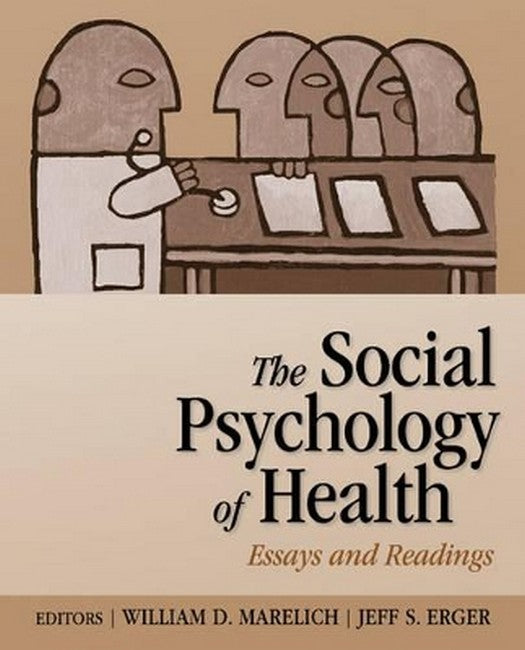William D. Marelich, Ph.D., is an Assistant Professor of Psychology at California State University, Fullerton. He is also a lecturer at UCLA and a consulting statistician with the UCLA Health Risk Reduction Projects. Dr. Marelich received his Ph.D. in Social Psychology from Claremont Graduate University and was an NIMH post-doctoral fellow at UCLA. He teaches courses in health psychology, close relationships, and quantitative methods. His research interests include decision-making strategies in health and organizational settings, patient-provider interactions, interpersonal relationships, and statistical/methodological approaches in experimental and applied research. He surfs as a hobby for health and peace of mind. Jeff S. Erger, Ph.D., is an Assistant Professor of Sociology at the University of Wisconsin, Eau Claire. He received his Ph.D. in sociology from the University of Iowa in 1997. He teaches courses in medical sociology, social psychology, and research methods. He has served as a University of Iowa Fellow and an NIMH post-doctoral fellow at UCLA and is now researching health care delivery to marginalized populations and the dynamics of communities in cyberspace. His research looks at the links between identity, community, and health. For his own health, he enjoys riding his bicycle and making chocolate truffles (but only once a year).
Request Academic Copy
Please copy the ISBN for submitting review copy form
Description
PART I. SOCIAL PSYCHOLOGY OF HEALTH: FOUNDATIONS Essay I-1: Introduction to The Social Psychology of Health Essay I-2: Health & Illness Seen Through Different Lenses Overviews from Various Fields 1. Taylor, S.E. (1990). Health Psychology: The science & the field. 2. Brown, P. (1991). Themes in medical sociology 3. Mullan, F. (2000). Don Quixote, Machiavelli, & Robin Hood: Public health practice, past & present 4. MacDonald, K.L., et al. (1985). Type A botulism from sauteed onions: Clinical & epidemiologic observations. Cause-Effect & Health Status 5. Engel, G.L. (1977). The need for a new medical model: A challenge for biomedicine. 6. Conrad, P. (1975). The discovery of Hyperkinesis: Notes on the medicalization of deviant behavior. Health Outcomes 7. Kaplan, R. M. (1990). Behavior as the central outcome in health care. PART II. HEALTH ATTITUDE CHANGE Essay II: Social Theory, Conforming, & the Change of Health Attitudes & Behaviors Overview of Change Strategies 8. Marelich, W.D., & Rotheram-Borus, M.J. (1999). From individual to social change: The present & future directions of health interventions. Individual & Group Change Models 9. Larson, E.B., et al. (1982). Do postcard reminders improve influenza vaccination compliance? 10. Wulfert, E., & Wan, C.K. (1993). Condom use: A self-efficacy model. 11. Hausenblas, H.A., Carron, A.V., & Mack, D.E. (1997). Application of the theories of reasoned action & planned behavior to exercise behavior: A meta-analysis. 12. Kelly, J.A., et al. (1991). HIV risk behavior reduction following interventions with key opinion leaders of population: An experimental analysis. Designing Health Behavior Interventions 13. Rothman, A. J., et al.. (1999). The systematic influence of gain- & loss-framed messages on interest in & use of different types of health behavior. PART III. THE HEALTH-CARE SETTING Essay III: Health Care Settings & Their Social Dynamics The Patient-Provider Interaction 14. Emerson, J.P. (1970). Behavior in private places: Sustaining definitions of reality in gynecological examinations. 15. Erger, J., et al. (2000). HIV health care provider/patient interaction: Observations of the process of providing antiretroviral treatment. Setting Defining the Illness 16. Rosenhan, D.L. (1973). On being sane in insane places. PART IV. STRESS, COPING, & SOCIAL RELATIONSHIPS Essay IV: The Process of Stress, Coping, & Empowerment Stressful Life Events & the Structure of Coping 17. Rabkin, J.G., & Struening, E.L. (1976). Life events, stress, & illness. 18. Folkman, S., & Lazarus, R.S. (1980). An analysis of coping in a middle-aged community sample. On Social Relationships & Health 19. House, J.S., Landis, K.R., & Umberson, D. (1988). Social relationships & health. Personal Responsibility & the Empowered Patient 20. Langer, E.J., & Rodin, J. (1976). The effects of choice & enhanced personal responsibility for the aged: A field experiment in an institutional setting. 21. Marelich, W.D., et al. (2002). HIV/AIDS patient involvement in antiretroviral treatment decisions. PART V. HEALTH POLICY & FUTURE PATHS Essay V: Health Policy, Future Paths, & Concerns Health Policy & Activism 22. Foreman, C.H. (1994). Institutions. 23. Wachter, R.M. (1992). AIDS, activism, & the politics of health. Behavior Change & Ethics 24. Kipnis, D. (1994). Accounting for the use of behavior technologies in social psychology. Looking to the Future of Health 25. Kaplan, R.M. (2000). Two pathways to prevention. Of Future Concern: Bioterrorism, Health, & Social Response 26. Holloway, H.C., et al. (1997). The threat of biological weapons: Prophylaxis & mitigation of psychological & social consequences.
"The volume includes classic readings as well as more up-to-date selections, and most are engaging, interesting, and easy to read. . . . The volume editors do a wonderful job of explaining concepts in easy-to-understand language and provide useful examples that students should be able to relate to. Undergraduates should find this a fun and relevant book to read, and the essays should provide a good starting point for class discussions. . . . One strength of the book is the breadth. The volume editors obviously have extensive knowledge and different perspectives to bring to this area." -- Erika Westling "The content of the individual essays and the introductions to the articles are thorough and very readable. Students will find them to be helpful orientations to the articles they are about to read. . . . The strength of this volume is the product of the disciplinary backgrounds of the authors. They have done a good job of actually drawing together into one volume significant articles from psychology, sociology, and to some extent, epidemiology and public health. This increases the range of the book. Most importantly from an educational standpoint, it supports an interdisciplinary approach to the social psychology of health." -- Dale D. Chitwood

